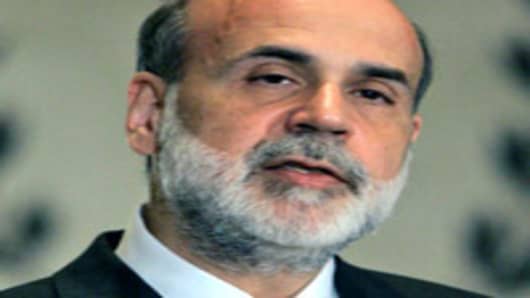On Tuesday, we had the Warren Buffett rally. On Valentine's Day, it was the Ben Bernanke selloff.
It wasn't that Federal Reserve chairman didn't say all the right things in his testimony before Congress. He signaled that the Fed was open to more interest rate cuts to help the struggling U.S. economy, and even said growth should pick up later in the year.
But the markets focused instead on Bernanke's somber assessment that the outlook for the economy had worsened in recent months and that risks to growth had picked up.
Stocks sold off shortly after his testimony was made publicat 10 am and never recovered.
"He was more bearish on the economy than he was before," said Arthur Hogan, chief market analyst at Jefferies & Co. After this week's better-than-expected report on January retail sales, investors found Bernanke's assessment of the economy particularly disheartening.
"To have the Fed come in and talk about how things could be getting worse, not
better, kind of takes the wind out of their sails," Hogan said.
Though Bernanke's comments reinforced investors' expectations the central bank would lower interest rates by a half-percentage point at its next meeting on March 18, the markets seemed to want more.
"Sometimes it's as if the chairman of the Federal Reserve is the chief economist of the United States, and what he says affects the markets as much as economic data releases," said Brian Gendreau, investment strategist at ING Investment Management in New York. "In this case, it may be what he didn't say."
The Fed has already lowered benchmark borrowing costs by 2.25 percentage points since mid-September, actions that have taken the overnight federal funds rate down to 3 percent.
U.S. short-term interest rate futures prices implied about a 20 percent chance the central bank will drop rates by three-quarters of a percentage point in March, up from the implied expectations earlier. A half-point cut is fully expected.
Bernanke told lawmakers the Fed will lower its projections for U.S. growth in forecasts to be released next week, bringing them closer into line with views in the private sector. In
November, it had said the economy would likely expand 1.8 percent to 2.5 percent this year.
The Fed chairman forecast a further drop in home building and related activities, and said a softer jobs market, higher energy prices and falling home values could be expected to
weigh on consumer spending in the near term.
Tighter credit is also likely to continue to hold growth back, he said. "A significant worsening in financial conditions or in credit availability would certainly be a warning bell that we need to take further actions," Bernanke said.
However, he also said he saw no imminent threat that mounting losses from the subprime mortgage mess would leave banks insolvent.
Even as he outlined downside risks to growth, Bernanke noted that inflation had moved up as a result of soaring prices for oil and food and the weaker dollar, adding that inflation risks bear close watching.
"To date, inflation expectations appear to have remained reasonably well anchored, but any tendency of inflation expectations to become unmoored or for the Fed's inflation-fighting credibility to be eroded could greatly complicate the task of sustaining price stability and reduce the central bank's flexibility to counter shortfalls in growth in the future," he said.
Bernanke's appearance before Congress, flanked by Treasury Secretary Henry Paulson and Securities and Exchange Commission Chairman Christopher Cox, comes at a time of turmoil.
U.S. economic growth slowed to a meager 0.6 percent annual rate in the fourth quarter of 2007, house prices have been falling, and in January the job market shrank for the first
time in 53 months.
The White House and Congress put together a $168 billion fiscal stimulus plan, which was signed into law by President Bush Wednesday. The plan offers tax rebates to households and incentives for businesses to invest.
Like Bernanke, Paulson said he saw the economy dodging a recession. "I believe that we are going to continue to grow, albeit at a slower rate, but risks are to the downside," he
said.
--Reuters contributed to this story


